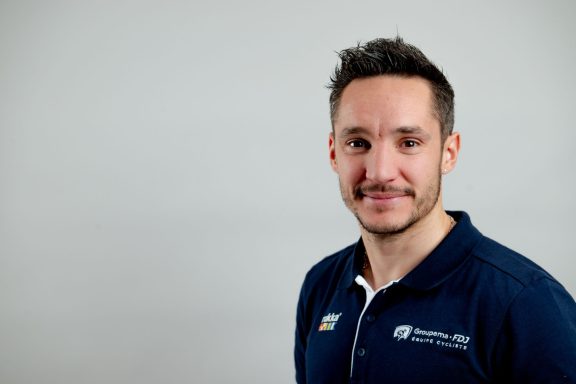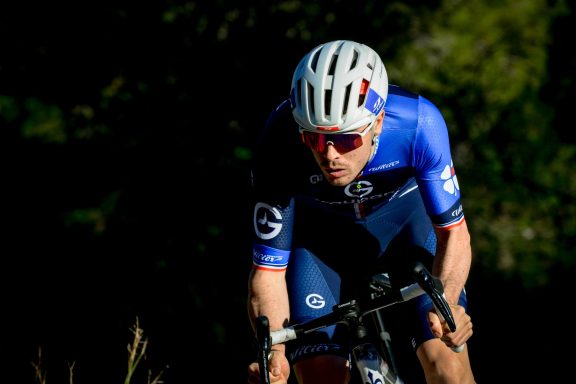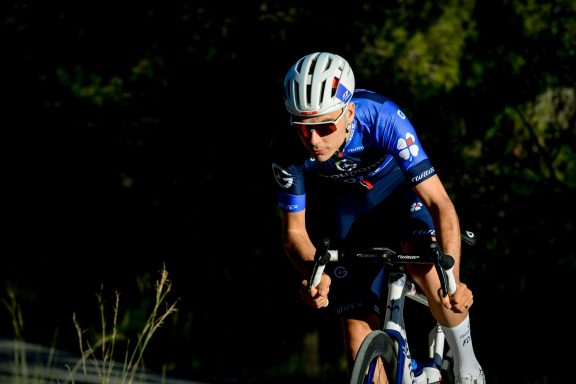For his second season with the Groupama-FDJ cycling team, Rémy Rochas has chosen Australia for his return to racing. A valuable teammate on the climbs in 2024, the 28-year-old from Savoy wants to take advantage of the Tour Down Under to show himself. He tells us about his preparation, his first year with the team and his hopes for the coming season.
Rémy, we last saw you in Italy in late October, and here you are in Australia in mid-January. How have been the last few months?
My season ended quite late because we kept going with the team after Il Lombardia for two great races in Veneto. Then it was time to take a break and enjoy the holidays a bit. We didn’t go on a big trip because our little one was born on February 15, so he was still a bit young for that. So we took the opportunity to visit my partner’s family. We also went to spend some time in Chamonix. It’s not very far from home, but it was still a way to switch off and change the atmosphere. I also took advantage of the time off to go out with my friends and family. In anticipation of the Australian campaign, however, I took a three-week break instead of a month. I got back into training gradually, but not just by cycling. I also really like running, especially trail running, and the region where I live is well suited to it. It means I could take my mind off things a bit.
“All the lights are green”
How did your return to training and your preparation go?
I had to adapt my preparation, but it didn’t cause any major change. The return to training was gradual but it also got more specific quicker. It was fine for me, because I don’t really like “wasting my time” when I start training again. I went to Nice before the December training camp, and we had already started specific work with my coach Nicolas Boisson. Then, the training camp in Calpe went slightly differently for the “Australia” group. We did a bit more specific work and also a bit more hours. I even extended the training camp by three days to then take a break for the end-year celebrations and avoid fatigue. I quickly returned to Nice after New Year, in order to do a final block of very specific work in preparation for the Tour Down Under. It went quite well, even though I suffered a crash that delayed my training block by one day. It was a stupid crash, but it hurt quite a bit. It was a blow to my morale at the time because I thought that the Australian campaign might already be gone. But the next day, once I got on the bike, I realized that everything was fine. I was able to resume my preparation, work well, the trip went very well, just like the first days in Australia. For the moment, all the lights are green.
Was doing this Australian campaign a wish of yours?
I became interested in it quite early last year. I discussed it for the first time on the Tour of the Basque Country jokingly with Jussi, who was my referent sports director. Throughout the year, I kept saying that I was motivated. That’s also what’s beautiful with our sport. We have the opportunity to travel and discover new places. I could also ask Jussi for information on the route, and I realized recently that I’m performing the best on this type of punchy profile. It was a real motivation, and I’ve had it in mind for a while. It also fitted perfectly with the team’s plans, so we went for it and I’m very happy about it.
Was adjusting to the local weather easy?
I’ve always loved the heat and we also worked a lot in preparation on the heat acclimatization. In particular, I did hot bath/sauna sessions, which is not the most unpleasant thing. On the other hand, the downside is that we also had to do home trainer sessions while being a little overdressed. I’m really not a fan of home trainer, but we had to do it. Since we got here, we haven’t had a proper heatwave. The temperature is around 36-37 degrees, it’s really very pleasant and I haven’t felt any undesirable effects.
“I would like to thank the team with a big result”
Physically, how do you feel?
Right now, I already feel really good on the bike. As I said, I don’t need much time to be in good form. I didn’t plan my preparation to make sure I’m not at 100% right away. Because if I can be at 100%, win the Tour Down Under, even if it means coming home a little tired, that’s no problem for me! The coaches and sports directors have also worked very well, and my program is really adapted afterwards. I think I won’t be far from my best level here, if all goes well and my preparation continues to be great as it has been so far.
Is this Tour Down Under an important goal for you?
The team gave me a lot last year, I improved, and I also think I helped the team quite a bit. With Quentin [Pacher], we are aware that we have opportunities to shine on our own in this kind of race. It would be a shame to say that we are going to Australia just for the trip and to change the routine. If we are there, we might as well prepare well and try to aim high. For sure, we’ll face a very strong field, but we come here with real ambitions. We will do our best. The general classification will be decided on the profiles that we really like, probably on stages 3 and 5. There are always some tricky stages, but physically wise, it should suit us very well. Personally, I would like to thank the team with a big result here.
What are you aiming for?
Winning a stage would be incredible. And if that happens, it means that I am also capable of doing a very good GC. The goal will be to show myself and seize the opportunities. The final circuit of the third stage will be really hilly and could lead to some aggressive racing. If I can find myself in a group that is fighting for the win that day, that would be great. And if I am able to fight for the win that day, I should be able to be up there in Willunga, even if it will probably be more of a 3km-sprint up the climb.
“My performance level has increased last season”
Is it also an opportunity to give it a try in a WorldTour race?
I already came close to winning a stage and a general classification in the WorldTour, on the Tour of Guangxi, but I was at the time at Cofidis (2023, editor’s note). Last year, I realized, with hindsight, at the end of the season, that I could have personally seized a few opportunities, and the team told me so too. That’s what’s really positive about being in Australia now. With Quentin, we will be able to be the team’s leaders, and if it goes well, it can give us confidence on a personal level, and make the team trust us again later in the season. On a Grand Tour, we are less capable of performing than our leaders for sure. We really appreciate working for others, giving a lot of ourselves, but what drives us is also the adrenaline of fighting for the win. I think we really have the chance to seize this opportunity here. And then, if the first races go well, our mates in front of the TV will be willing to do the same.
You are about to start your second year with the team. How did the first one go?
First of all, I really want to thank the team for their confidence in signing me last year. From the start, I felt that the team had a clear idea of performance. It was a big change for me, and it also brought me a lot from the start of the season. It worked very well right away. We won thanks to Kevin on La Marseillaise, and I was able to be a part of his victory. In Bessèges, even if we didn’t win, I also had a lot of fun personally and I was able to perform well. I was also included in the group for the Tour with some of the best riders in the team. Everything went very well. Even if I didn’t shine as much in terms of results, I shone in the way I helped the team. I was performing consistently until I came back to racing on the Critérium du Dauphiné, where I crashed and suffered a concussion. That put a bit of a stop to my season. For a month, I was really struggling. I couldn’t climb the stairs at home. Then I got back on track with the Vuelta in mind. The return to racing went well with the Vuelta a Burgos and the Clasica San Sebastian, then the start of the Vuelta was very good before an illness completely knocked me out. My end of the season was a bit more difficult, even if there were also some positive sides. In short, my performance level increased last season, but I would have liked to translate that into more big results. That will be the goal this year.
Despite the setbacks, did you feel at 100% at certain times?
I didn’t have this feeling all season, but I think I was at 100% in some races. For example, at the start of the season in Bessèges. I also discovered that I was more and more capable of fighting for the win on punchy stages, or small uphill sprints. In Catalonia, I came sixth in the first stage. In Burgos, I came fourth even though I made an 800-meter effort to launch our sprinter. Those days, I was really at 100%.
“I need to be optimistic and positive”
You also broke away in the two Monuments you took part in.
Paradoxically, these are two periods where I was a little weakened. In Liège-Bastogne-Liège, I had some allergy problems, but I was able to take the breakaway and perform well. At Il Lombardia, I was coming off some digestive problems, but I recovered well and was able to have a good day at the front, after a strong attack at the start. Those are definitely good memories.
What about your integration and your position in the team?
I came here to take a domestique role. I really enjoy this role, and over time, I have also been given a few opportunities to go for results myself. I also like taking on a bit of leadership. I have also been road captain a few times. It is a duty that I really enjoyed, because even if I am not an old guy, I have a few seasons under my belt and a bit of experience, especially in races that I have already competed in. As for integration, I generally fit quite quickly into a group, and I also think I am inclusive towards the youngsters. I’m a bit of a joker (laughs), but I like being like that. I need to be optimistic and positive.
What goals do you have in 2025?
First, to fulfil my role as a domestique. For example, my first big goal with a leader, namely David, will be the Tour de Romandie-Giro sequence. I want to be at 100% of my ability in order to be able to support him as far as possible. My goal will also be to be consistent regarding my performance level. If everything goes as I hope, I should be able to seize the opportunities that come, especially since I still haven’t won a race among the pros. That will also be a goal, no matter the race.
“I found new momentum”
Are you obsessed with seeking this first victory?
Not at all, but sometimes I realize that I really have the capacity to get it. If the stars are aligned, if I have great legs, and if everything goes perfectly, I know that I am capable of winning races. But it doesn’t obsess me. I do my best, I do what I know I can do, and I trust the team. When things have to work out, they will. Last season, when I was going strong at the start of the Vuelta, I really had in mind to fight for a stage win by taking a breakaway. Unfortunately, it never came together. You have to succeed in seizing the right opportunities at the right time. When I train, I do it to perform as well as possible, and performing as well as possible means winning in the end. Now, it all depends on the team I’m in, the group I’m in, which leaders I’m with, and the race profile. In which case, I can also use what I’ve gained in training to help a teammate win.
What will your program be after the Australian campaign?
When I come back from Australia, I will go to Algarve, where there are surely opportunities to seize with Romain. I hope he can count on me to help him win a stage, or better. Then I will be on O Gran Camino, where the team will be mixed between WorldTour and La Conti riders. I will enjoy racing with the younger ones, and I will surely also have leadership in a race that suits me very well. Then, I will be with some leaders on the Strade Bianche and on the Tour of Catalonia. Then, I will switch with David on the Tour de Romandie and the Giro, where I could also have opportunities to be aggressive.
You joined the WorldTour at the age of 24. How do you see the evolution of your career since then?
I spent three years at Cofidis, where I progressed very quickly, but I found new momentum at Groupama-FDJ last year. I really felt like a neo-pro. My entire profile as a rider has strengthened. I feel that I am improving over the years, in terms of repeating efforts, in managing efforts. I am increasingly capable of making a decisive effort at the end of a difficult race. I feel that I am entering my best years. Last season, I was always ready when I had to be, but the issue was more about building my races. Winning is not innate for everyone. You have to understand how it works, and it is by being able to fight for the win regularly that you understand it. By listening to riders with my profile, like Rudy or Quentin, I also realized that when you have opportunities, you need to know how to optimize your effort throughout the race. When you feel like you have the legs, sometimes you have to be patient, sometimes you have to dare to anticipate. It depends on the races and that’s also why it’s difficult. I can still gain a few percentages on my ability to read the race in the money time, in the key moments.


